HISTORY STATISTICAL MEMBERSHIP
Biographical
IN MEMORIAL
(Continued)
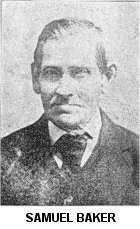
Biographical
IN MEMORIAL
(Continued)

Samuel Baker was born September 16, 1821. He was a man of commanding ways; everything he did he tried to do with the energy and might that was in him. He was baptized and admitted to the Greenwich Presbyterian Church on September 20, 1840, by the Rev. Dr. X. Junkin. In the year 1858 he became a member of the First Presbyterian Church of Phillipsburg, N.J., and on December 19, 1858, he was installed as an Elder of the church. he started to work at once and organized a Union Sabbath School at Green's Bridge in a schoolhouse owned by John Feit. In May, 1865, they removed the school to a schoolhouse near the St. James' Lutheran Church, and on October 22, 1865, closed the school on account of the bad weather during the winter months. During the time that he was conducting the Sunday School at Green's Bridge, he had moved in that locality and again united himself with the Greenwich Church. On April 26, 1862, after being absent four years, he returned to Phillipsburg and again united with the First Presbyterian Church April 8, 1866. He was elected Elder for the second time and installed February 1, 1874.
In September, 1869, Mr. Baker, assisted by Mr. Lewis M. Teel, organized a School in the Third Ward in the private house of Mr. and Mrs. Stephen Frace. Mr. Baker was elected Superintendent. The Sabbath School grew so large that they could scarcely find room to accommodate them all, so they closed the school for the winter. On April 20, 1873, he again organized a Sunday School in Howell's Flat close by the Sheet Mill. He was assisted by some Students of Lafayette College. They had such success that out of it has grown what is now called the Howell Chapel Sunday School. In the year 1874 they again began to collect the members of the Third Ward School together, and the new schoolhouse being built, they met in the High School room of the building, and on May 17, 1874, he was again elected Superintendent.
The school grew from year to year, and out of it an association was formed to see what could be done about buying a lot and building a church.
Mr. Baker moved to Stewartsville
in 1876 and returned to Phillipsburg in the year 1885 when he again connected
himself with the Sunday School in the Third Ward, and remained a teacher
in the school until they organized the Westminster Presbyterian Church,
April 26, 1886, of which he became a charter member. He still attended
the Sunday School until within a few months of his death. He died
on September 26, 1898, aged 77 years and 10 days. Thus ended the
life of one who tried to teach others the way of Christ. Should not
these old patriarchs be remembered for what they have done?
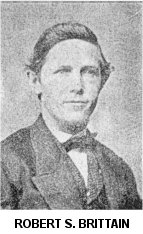
Robert Simanton Brittain was the youngest child of Robert and Sidney (Evans) Brittain. He was born January 18, 1836. He grew up on his father's farm near what is now known as the "Three Churches" in Lower Mt. Bethel, Northampton County, Pa. He grew up in a Christian home which had close relations to the Presbyterian Church of that place. He joined this church on profession in the Spring of 1855.
In 1858, when he was twenty-two years of age, the old home was broken up, his father having died the preceding year. That Summer he spent on a farm near South Easton. The following Winter he attended the Academy in Phillipsburg, N.J., conducted by Samuel Freeman.
In the Spring of 1859 he opened a stationery and notion store, in the Square, Phillipsburg, N.J., and continued in this business, until near his death, adding that of the daily newspaper in a few years. He died October 9, 1879, in his forth-fourth year.
April 3, 1861, he was married by Rev. James Y. Mitchell to Miss E. Jennie Woodward, of Mansfield, Conn.
Mr. Brittain was elected
Elder January 25, 1874, serving in this office until his death. He
was a thorough, conscientious Christian, an indefatigable worker for his
church and Master, a safe counselor and an unfailing friend.
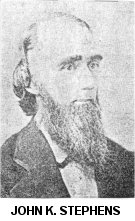
Many of the readers of this historical sketch will remember the familiar feathers of John K. Stephens, one of the willing workers in the interests of Christ's cause in this community. He first united with the church March 30, 1872, and for many years served the church in the capacity of Trustee and Elder. To the latter office he was elected June 20, 1875, serving until his death.
He was a man of deep spirituality,
a true friend and companion, and an earnest Christian gentleman.
He being dead, yet speaketh.
"There is no death! What seems so is transition;
This life of mortal breath
Is but a suburb of the life elysian
Whose portal we call death."In that great cloister's stillness and seclusion,
By guardian angels led,
Safe from temptation, safe from sin's pollution,
He lives whom we call dead."
CHARLES A. HECKMAN
Charles Adam Heckman was
born in Easton, Penna., December 3, 1822. He was graduated at Minerva
Seminary in his native town in 1837. In the war with Mexico he served
as First Sergeant, First U.S. Volunteers. He was commissioned Captain
in the First Pennsylvania Volunteers April 20, 1861, became Major of the
Ninth New Jersey on October 3, Lieutenant Colonel December 3, and Colonel
on February 10, 1862. On November 29, 1862, he was made Brigadier
General. He served in Burnside's Expedition to North Carolina, and
afterwards in the Army of the James, being wounded at Newbern and Young's
Cross Roads, N.C., and Port Walthall, Va. He commanded the defenses
of Norfolk and Portsmouth, Va., in the winter of 1863-4, and at Drewry
Bluff, Va. On May 16, 1864, he was captured after his Brigade had
lost between 1,600 and 1,700 out of 2,100. He was taken to Libby
Prison, Macon, Ga., and Charleston, S.C., where he was one of fifty-one
officers placed under fire of the national guns. He was exchanged
on August 25th and commanded the Eighteenth Corps at the capture of Fort
Harrison, Va., and organized and commanded the Twenty-fifth Army Corps
in January and February, 1865. He resigned when the war was over,
May 25, 1865. He was afterward in the employ of the Central Railroad
of New Jersey, latterly as dispatcher at Elizabeth, N.J. He served
some time as a member of the Phillipsburg Board of Education. He
was Elder for several years of this church, and also Superintendent of
the Sunday School in the Third Ward, which developed into the Westminster
Presbyterian Church. He died January 14, 1896, at the home of his
son in Germantown, Philadelphia, his death being primarily due to an old
wound. He is buried in the family plot in the Easton Cemetery where
a monument has been erected to his memory by his comrades of his "Red Star
Brigade."
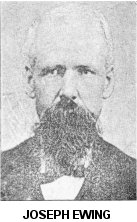
The above is a fair likeness of another good, staunch Presbyterian, who for many years faithfully served the church of his choice and worked for its unity and success.
Joseph Ewing was born in the northern part of Ireland, of good old Scotch parentage, in the year 1839. He came to America early in life and in 1861 located in Phillipsburg where he lived until his death.
Mr. Ewing was a strong man, mentally, morally and physically, a kind and loving father and husband, a good citizen and above all a thorough, conscientious Christian gentleman. His heart was in his church, and whether as Trustee or Elder, he labored zealously for his Master and the church from his admission until his death.
Mr. Ewing held a responsible position on the Central Railroad of New Jersey for many years, being Chief Car Inspector on all lines from Scranton to Jersey City. The men under hs supervision loved and respected him for his many words and acts of kindness, and his death brought grief to their hearts.
In the death of Elder
Ewing, our church lost a faithful friend and wise counselor.
"O hearts that never cease to yearn!
O brimming tears that ne'er are dried!
The dead, though they depart, return
As though they had not died!
The living are the only dead;
The dead live,--nevermore to die;
And often, when we mourn them fled,
They never were so nigh!Why should memory, veiled with gloom,
And like a sorrowing mourner craped,
Sit weeping o'er an empty tomb,
Whose captives have escaped?
'Tis but a mound,--and will be mossed
Whene'er the summer grass appears;
The loved, though wept, are never lost;
We only lose--our tears!"
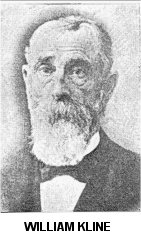
William Kline was born at Asbury, Warren County, N.J., March 3, 1834. His parents were Godfrey and Mary A. Kline, prominent in the history of Warren County.
Mr. Kline spent part of his life in the South, returning North and taking up his residence on Delaware Park in the Spring of 1882.
For many years he served as Trustee of the Harmony Presbyterian Church and for a period of the thirteen years was Collector of Taxes for the Township of Lopatcong.
Mr. Kline united with this church June 8, 1884, and was elected ruling Elder January 30, 1887, which office he filled until his death--September 19, 1902. His wife, Mrs. Elizabeth Kline, also an earnest, consistent member of the church, died December 21, 1901.
Elder Kline was a quiet, sincere Christian gentleman, whom everybody respected for the uprightness of his life and character. His death was a great loss to the church he loved and served so well.
His son, Dr. William Kline,
one of our best known physicians, is a member of this church.
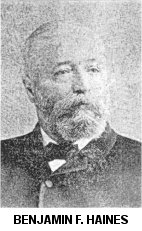
Col. Benjamin F. Haines was born November 30, 1836. The above likeness shows him in the full vigor of his manhood. The title "Colonel" was won upon the field of battle during the dark days of '61 to '65.
Elder Haines distinguished himself as a soldier, being advanced from Lieutenant to Captain, from Captain to Colonel and at the close of the war to Brigadier General by brevet. While a good soldier on the field of battle, he was equally attentive to duty as a member of the church. Sunday morning and Sunday evening found him in his accustomed pew in the sanctuary. Wednesday evenings found him in the prayer-meeting where his voice was heard in prayer and praise.
In the Men's Prayer Meeting, every Sabbath morning, while his health permitted, the voice of Colonel Haines was lifted to God, and his fatherly advice was of much benefit.
While residing at Port Morris he was ruling Elder in the Stanhope Presbyterian Church. He united with our church September 6, 1889, and in less than six months thereafter (February 2, 1890,) he was elected Elder, which position he filled until his death--September 28, 1903.
His devoted wife is a
member of our church, and has the sympathy of the entire community in the
loss of her husband.
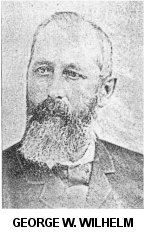
George Washington Wilhelm was born in Easton, Pa., on the 22nd day of February, 1828. Most of his life was spent in this vicinity, having moved from Cumberland, Md., more than forty years ago.
Prior to his coming to Phillipsburg he was not a member of any church, though always leaning toward the Presbyterian denomination. While attending a railroad men's meeting, Mr. Wilhelm was so favorably impressed by the sermon of Mr. Townsend that he was converted and with his family united with this church.
He was a very active member until the time of his death, serving as Superintendent of the Sunday School for many years, as a Trustee and later as a ruling Elder, which office he held until the time of his death.
His heart was always with the church and he attended services regularly so long as his health permitted. He died March 3, 1898.
"I would not live always; no,--welcome the tomb!
Since Jesus hath lain there, I dread not its gloom;
There sweet be my rest till he bid me arise,
To hail him in triumph descending the skies."